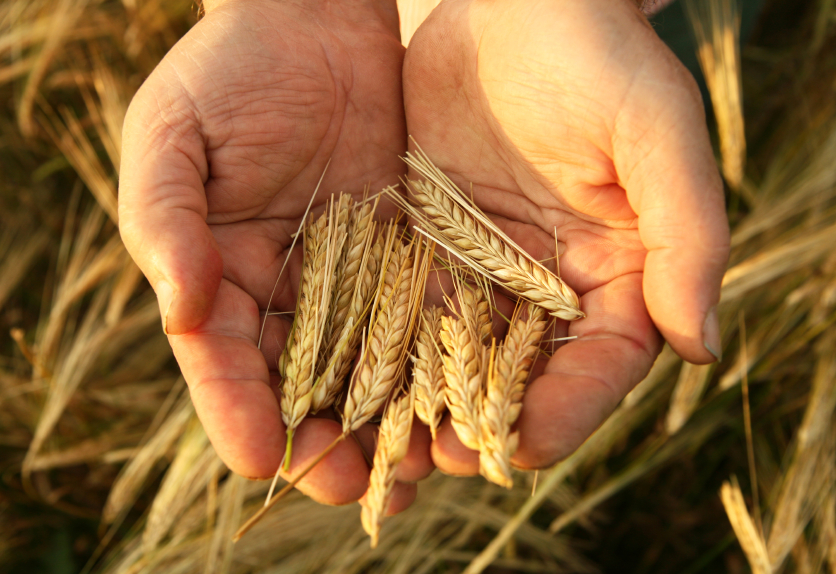Azerbaijan intensifies works on grain self-sufficiency policy

By Nigar Orujova
Azerbaijan, which recently exempted import and sale of wheat as well as production and sale of flour and bread from the value added tax, enjoys opportunities to fully provide itself with grain, experts say.
Head of Qarabag-taxil company Rajab Orujov said grain growing is one of the strategic directions for any country, including Azerbaijan, which is home to durum wheat.
About 3 million tons of grain was produced in Azerbaijan last year, and some 1.7 million tons of these products were wheat.
He further added that a project on creating large grain-growing farms is underway, and several such farms have already been created. As a result, grain crops in the country will cover area of about 200,000 hectares.
Currently, the grain produced in Azerbaijan does not allow securing internal needs by 100 percent, he noted.
“There are subjective reasons behind this. It is necessary to provide the farms with high-quality seed varieties and competent agro-plan that is to ensure the timely application of fertilizers and agro-technical measures.
“In this case, the volume of domestic grain production can allow to completely ensure consumption. Today, our production meets the demand for grain by 60-70 percent, and the rest is purchased,” he said.
Orujov went on to add that at present the grain growing could also be developed by intensive ways.
“We need to attract new and innovative technologies, which will increase productivity and allow us in the future, given our crop area, self-sufficient in food grains,” he noted.
The abolition of VAT has greatly reduced the wholesale prices on wheat, flour and bread. Depending on the transportation expenditure, the wholesale price of one bag of flour of 50 kg varies from 21.5 to 22.5 manats ($14-14.3) and retail price – from 23 to 24 manats ($15-15.3).
Thanks to this decision, the country expects some 10-20 percent decline in prices for flour production, believes Shahin Nagiyev, an official at the Economy Ministry.
The ministry reports that the price of flour and bread in Azerbaijan are much lower than in neighboring countries. The order also made possible to decrease prices for bread. Thus, the 500 grams of bread is now sold at 0.30 manats ($0.19), and 700 grams at 0.40 manats ($0.25).
Meanwhile, 50 kg bag of flour costs 31-32 manats ($19.5-$20) in Georgia, and 30-33 manats ($19-21) in Turkey. As for the price of bread, now in Azerbaijan, the cost of 500 grams wheat bread is 0.30 manats ($0.18), in Georgia the cost of such bread is 0.50-0.70 manats ($0.31-$0.44) and in Turkey – 1.10-1.20 manats ($0.69-$0.27).
Exemption from VAT also contributed to an increase in consumer purchasing power, store manager at Rahat Market Yusif Aliyev said.
“Reducing the cost of flour contributed to increasing purchasing power of consumers. This product enjoys high demand and sold in packages and in bulk. If we look at the price tags, the difference is very noticeable, and certainly reducing cost of flour affects the price of bakery products, the cost of which is also reduced,” he said.
Moreover, major bread producers plan to double its production in 2017.
CEO of the EL Company Tofig Aliyev said a second production line will soon be launched.
“The launch of this line will increase the daily volume of bread production from the current 15 tons to 30 tons. We are importing grain from both Russia and Kazakhstan, but Russia is the main supplier. The grain supplied from this country has a number of advantages in quality. We also buy grain from local farmers,” said Aliyev.
At present Azerbaijan is not ready to completely cover domestic needs of grain, he added.
“The neighboring Turkmenistan is currently self-sufficient in grain. Uzbekistan reduced cotton sowing by half and replaced it by crops of grain, thus provided the domestic demand for this product. I am sure that Azerbaijan will soon be able to provide the domestic demand for grain,” he noted.
“It is necessary to build the appropriate infrastructure and improve human resources. Of course, it will take time. However, I am confident that this sector will be one of the important directions for development of non-oil sector of Azerbaijan,” Aliyev stressed.
To improve the quality of local grains, he said, it is required to implement agro-technical measures, conduct research to determine the areas of crops, made classification of cultivated grain, and ensure the timely collection and preservation of these products.
__
Nigar Orujova is AzerNews’ staff journalist. Follow her on Twitter: @o_nigar
Follow us on Twitter: @AzerNewsAz
Here we are to serve you with news right now. It does not cost much, but worth your attention.
Choose to support open, independent, quality journalism and subscribe on a monthly basis.
By subscribing to our online newspaper, you can have full digital access to all news, analysis, and much more.
You can also follow AzerNEWS on Twitter @AzerNewsAz or Facebook @AzerNewsNewspaper
Thank you!
